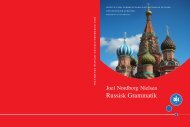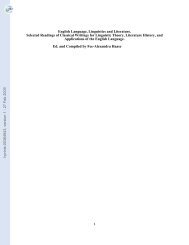[hprints-00683151, v2] Enea Silvio Piccolomini (Pius II ... - Hprints.org
[hprints-00683151, v2] Enea Silvio Piccolomini (Pius II ... - Hprints.org
[hprints-00683151, v2] Enea Silvio Piccolomini (Pius II ... - Hprints.org
Create successful ePaper yourself
Turn your PDF publications into a flip-book with our unique Google optimized e-Paper software.
<strong>hprints</strong>-<strong>00683151</strong>, version 2 - 19 Mar 2013<br />
Bourges (but on the other hand the Crown would not want the French church to<br />
become too strong and independent of the royal power). 85<br />
Moreover, the high clergy and the king both wanted to have the council transferred<br />
to Avignon in order to strengthen French influence over the council and – who<br />
knows – may be later to effect a transfer of the papacy back to Avignon and the<br />
French sphere. The anti-Italian attitude of the French party was quite clearly put by<br />
the Bishop of Tours, Philippe de Coëtquis who said: “Either we should snatch the<br />
Apostolic See from the hands of the Italians, or we should leave it plucked bare, so<br />
that, wherever it remains, it can do nothing.” 86<br />
But the king himself also wanted to have the pope as his ally in the question of the<br />
Kingdom of Naples where the House of Anjou, part of the extended royal family of<br />
France, was battling for the crown with the Spanish House of Aragon. So the French<br />
king did not wish to antagonise the pope who had until then favoured the French<br />
claims. It is, therefore, not surprising that the king sent one his most seasoned<br />
diplomats, Simon Charles 87 , to Basle in order to ensure that his fiery clerics would<br />
not jeopardize his relations with the pope and compromise the French cause in<br />
Southern Italy.<br />
In the matter of the venue for the council, Simon thus played a subtle role. No doubt<br />
he secretly preferred Avignon, but publicly he remained in the role of a cautious<br />
adviser and a friend of the council who accepted and respected its independence. So<br />
he did not declare himself openly for Avignon. This ambiguity <strong>Piccolomini</strong> exploited<br />
recklessly in his speech when he exclaimed that what the king’s ambassador asks is<br />
good and worthy of being granted. For Simon admonishes us to avoid grounds for a<br />
schism, he asks us as to agree a location with the pope, and he does not recommend<br />
or reject any place by name. If I am not mistaken, his words advise us to choose to<br />
Pavia … 88<br />
The French clergymen at the council were probably quite exasperated at hearing<br />
this, and <strong>Piccolomini</strong> himself at the end of the speech took care to soothe the<br />
85 Stieber, pp. 64-71<br />
86 <strong>Pius</strong> <strong>II</strong>: Revised, p. 346<br />
87 Helmrath: Basler, p. 87<br />
88 Section 48<br />
31


![[hprints-00683151, v2] Enea Silvio Piccolomini (Pius II ... - Hprints.org](https://img.yumpu.com/16048892/31/500x640/hprints-00683151-v2-enea-silvio-piccolomini-pius-ii-hprintsorg.jpg)
![[hprints-00284881, v1] Musik i gymnasiet](https://img.yumpu.com/17715560/1/190x245/hprints-00284881-v1-musik-i-gymnasiet.jpg?quality=85)

